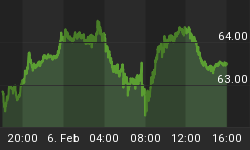Parts of the below commentary were originally posted (www.murkymarkets.com) on October 20, 2008.
I have received many emails from readers about the public article I wrote last week on the issue of the current deflation scare. Those arguing against my position believe the US will not experience inflation as quickly as some might expect.
I have great respect for some of the analysts on either side of this debate. Coming from more of a fundamental rather than technical background, I am not too concerned about all the little nuances inherent in this debate, and I do not care to delve into it, other than for the purposes of ensuring our big picture investment strategy is correct.
To get to the nitty gritty, the argument boils down to the fact that the monetary base, M0 (actual currency in circulation) can not and will not expand fast enough, if the Federal Reserve went on a "printing" rampage, to make up for the contraction in the broadest measures of money supply, i.e., money AND credit, such as M3. It is argued that because of the credit crunch, any M3-like measure will decrease substantially, much more so than what the Fed can "print" into circulation, bringing on deflation.
Consider that we also have what has been dubbed the ‘Shadow Banking System', an unregulated market with its slew of derivatives and CDO's circling the globe. There is also the trillions in credit default swaps (CDS), which are supposed to insure against losses to banks and bondholders when companies fail to pay their debts. The market for these securities is enormous - it now dwarfs the value of US Treasuries outstanding. Since 2000 to early 2008, it has ballooned from $900 billion to more than $45.5 trillion, roughly twice the size of the entire US stock market.
It is therefore argued that if this expanded credit market -- both official and shadow -- implodes tens of trillions will be lost. A Fed creating a meager 1 or 2 trillion would be meaningless, and we would get deflation, because "broad" money measures would decrease by much more than 1 or 2 trillion of "narrow" money infusions by the Fed.
It is obvious that 1 or 2 trillion would not be enough if tens of trillions were lost in the credit markets, all else being equal. But the key question here is how such an outcome would impact our investments, namely gold, silver, energy and the shares of companies in those sectors. In that respect, it is important to determine which assets did particularly well during the "bull" run in credit creation, as it those assets that are most at risk from a credit contraction.
From an article I wrote last year, it was shown that the Federal Reserve's own inflation adjustment calculator shows that using the government's version of inflation (i.e., the 2-3% kind) today's price of gold should be about $2129.62, given an $850 price from 1980. I also said that if we were to assume an inflation rate of 10% since 2002 -- the point in time when the Fed's reflation efforts kicked into high gear and oil prices took off -- we get a gold price today of about $3234.58.
Gold at the time of writing of this piece is $799. Silver is just under 10. So it seems gold and silver, even when they were at their highs from earlier this year, have been following the more narrow monetary supply measures.
In other words, the metals, and perhaps oil as well, have NOT appreciated in a manner consistent with money supply growth as reflected by the broader money supply figures, i.e., money AND credit. So if the assets my readers and I invest in have not appreciated in a manner consistent with the credit inflation that, at a minimum, M3 would suggest has occurred, why would M3's contraction translate to a collapse of those asset prices?
It shouldn't. That's my point. The fact that they have is simply, in my opinion, a result of the forced deleveraging of hedge funds and others who invested in the toxic paper now plaguing the banking system, which has seen them hurt in a big way as they sell anything they can to pay back debt and deal with margin calls.
I therefore do not see an across the board monetary deflation. Had we been invested in the housing sector, bank stocks and other assets that did indeed ride the credit wave, then that would be a different story, as the credit deflation that has occurred would have clear implications for those investments. I do not see how gold and silver fall into that category.
In addition, the US dollar has seen fit to rise during the last few months of this saga. This is strange in that it would seem to me the growth of the credit markets during the last decade would have lended support to the dollar, as foreign money poured in. The fact that the dollar would retain that support, let alone gain strength during a confidence-sapping credit contraction, does not stand to reason in my way of thinking.
But like a t-shirt weather week during a cold Canadian winter, crosscurrents can, temporarily, confuse many. But I'm not packing up the winter clothes just yet. The monetary base has in the past couple of months turned up in a big way and will continue to do so as the Fed will be forced to literally print its way out of this mess. This should be music to the ears of our investments soon enough.















